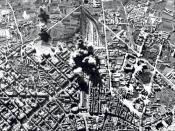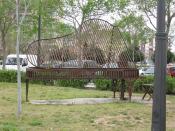In Slaughterhouse-Five, Kurt Vonnegut's unique vision of time and travel reveals his philosophical view toward the concept of free will. Throughout Slaughterhouse-Five, Kurt Vonnegut argues that the loss of free will is affected by a parallel of controllable and uncontrollable events that occur in the life of the protagonist, Billy Pilgrim. Vonnegut argues that Billy's loss of free will results from his experiences in life, specifically, his childhood, marriage, and participation in war. The dark humored novel stresses the point that given the ability to harness free will, i.e. control his destiny, man, being an egocentric creature, finds it an impossible task. This is seen through Billy's lack of resolve when faced with the primary decisions he must make. He seems to always be the passive receiver of various actions rather than the aggressive initiator.
Through war, Vonnegut shows how free will is lost in several ways. One example is through death.
While finishing high school and taking night classes at the Ilium School of Optometry, Billy is drafted into World War II and sent overseas. There he is thrown into the Battle of the Bulge in Belgium where he is immediately taken prisoner behind German lines. Being drafted opposed to volunteering for duty in the war illustrates Vonnegut's case that Billy's loss of freedom is not through his own choice. At the same time Billy is in control of his actions by the fact that he did not oppose his draft, however while being a prisoner of the Germans, he allowed himself to be played as a puppet: "When Billy Pilgrims' name was inscribed in the ledger of the prison camp, he was given a number, too, and an iron dogtag in which that number was stamped" (91). Billy, when tagged, symbolizes that he was under German control;...


